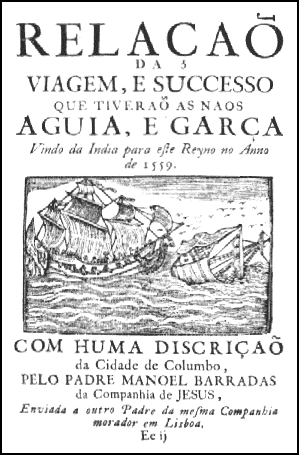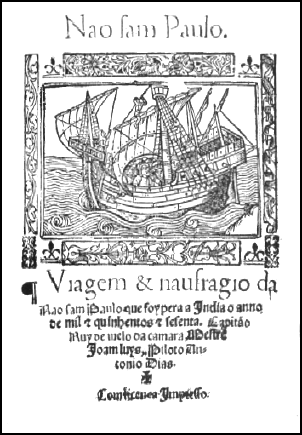History of
The Sea
C. R. Boxer, Editor and Translator
With additional translations by
Josiah Blackmore
(Minnesota)

You think you got troubles but compare yourself for a moment to the writers who lived through the seven shipwrecks described here. Junger's Perfect Storm is just a continuation of a long tradition of sea-horror stories --- and The Tragic History of The Sea offers up some of the earliest, from the 16th and 17th Century, drawn from a considerable body of Portuguese sailing tales.
Going about in "carracks" was no small venture. The ships were often built out of shoddy materials and repaired in a haphazard fashion. The captains were often recruited from the Portuguese nobility, being the idle rich who knew nothing about sailing. There was only the most primitive of navigating equipment --- sightings on the stars, or the sun. Because there were no chronometers, it was at best a guessing game.
The mortality rates for the trips, typically from Lisbon to Goa, were astounding: an outward bound vessel with 600 or 700 on board would often return with 200 or so wracked souls. Scurvy, malnutrition, lack of water, becalming, vigorous storms would all contribute to the general mayhem.
So why did they do it? It was all a matter of capital gains. For the investment of passage of a fully loaded ship returning to Lisbon from Goa would often repay itself by a factor of more than a thousand --- silks and spices and luxury goods (especially pepper) were much sought after by the new European middle class. Everyone on board --- at least those who survived --- would participate in the gains.
The Tragic History of the Sea tells of seven voyages that went astray --- mostly along the coast of West Africa. The Portuguese and the Dutch, who most often traveled this route, had sown the seeds of their own misfortune, for once on land, there was considerable problem with the "kaffirs" (a generic and not very polite term, the editor points out, for "Hottentots, Bantu, and crossbreeds.") These indigenous peoples had suffered from continual thievery, murder, and enslavement by foreigners --- and so tended to be hostile to those who came ashore, especially in large numbers after a shipwreck.
Of the seven tales related here, the most fascinating is the Wreck of the São João Baptista, written by one Vaz d'Almada who, along with several hundred others, was cast ashore from 3 October 1622 until 28 June 1623.
The tale of the sinking of the ship itself is a small part of the narrative. The bulk concerns marching up the coast from the Keiskama River where they landed, and up some 600 tortured miles to end up in Sofala.
They so feared Africa, at first, because of religious scruples. It was a place they thought of as, as d'Almada writes, "a heathen land," where they might be "perverted by their evil customs and ceremonies." But perversion turned out to be only a small part of the agony. They found storms and torrential rivers and dysentery and swamps and bugs and monsters.
The "kaffirs" harassed them mercilessly --- stealing everything they had as they tried to make their way north. The ship-wrecked party was in very alien country --- although to those who lived there, it was lush and fertile. The refugees from the sea were always in a hurry, always hungry and thirsty --- at times taking on very strange foods. There was, for instance, dog:
They make very good food...for often when I had cow's flesh and there was a fat dog to be had, I chose the latter in preference to the beef.
Then there was, ulp, cow dung,
The cow was ordered to be killed and divided, and it was eaten roasted. It was our habit not to reject anything but the large dung, for the smaller, and the hoofs, marrow of the horns, and hide, were all eaten.
And --- bless my soul, hold onto your hats --- they found themselves tempted by the smell of some very strange meatpies:
My comrade Gregorio de Vidanha told me to go and see what meat our servants were roasting that smelt so appetizing. I went to look, and asking one of them what it was, he asked if I would like to eat some, for it was excellent and very strengthening. But realizing it was human flesh, I went away, pretending not to understand.
 If all this ghastly food wasn't trouble enough, there was no end of trouble within their own company --- dissenting, infighting, sulking. The captain was one of those iron-rod types who, whenever one of the slaves acted guilty or one of the young Portuguese stole a bit of food --- had them tortured or killed forthwith. He was harder on the "kaffirs." At one village, two matchlocks were stolen, so they marched back to the village, and "killed every living soul we found there," presumably, according to the editor, men, women, and children.
If all this ghastly food wasn't trouble enough, there was no end of trouble within their own company --- dissenting, infighting, sulking. The captain was one of those iron-rod types who, whenever one of the slaves acted guilty or one of the young Portuguese stole a bit of food --- had them tortured or killed forthwith. He was harder on the "kaffirs." At one village, two matchlocks were stolen, so they marched back to the village, and "killed every living soul we found there," presumably, according to the editor, men, women, and children.
The narrative of the wreck of the São João Baptista is not only a crackerjack tale of risk and misery and want, but it is filled with lore of the peoples among whom they were cast. When they arrived at a "kraal," and described to the people how their ship had been sunk by a terrific storm, the people showed themselves to be "more compassionate than any we had yet met," to the point of letting the sea know what they thought of the treatment it had meted out to these folk,
For the women and children went down to the beach and threw many stones into the sea, uttering certain words which seemed like curses; and then turning their backs upon it they lifted up the skins which covered their backsides and exhibited their arses to the ocean. This is the worst form of insult which they have.
Much of the interest in this volume comes from the character of the author, d'Almada. The history was written for the consumption of the nobility back in Portugal, and he misses no opportunity to gossip about the others, and to paint himself in a heroic light. Aboard ship, he tells us, the Captain ignored sane advice, following that of "an obstinate clown," thus endangering all their lives. The boatswain's-mate was "proud, unruly, and insolent." Once ashore, it was d'Almada that the people turned to naturally and gratefully when the Captain died.
This is fascinating stuff, and it's especially reassuring to learn that the people of that time were as capable as we of being vain, proud, and, at the worst possible time, shooting themselves in the foot.